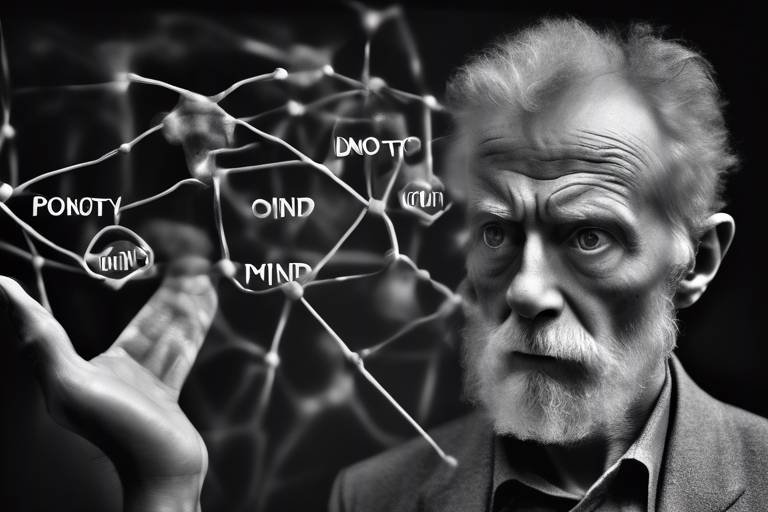Metaphysics - The Origin of Thought and Reality
Welcome to the intriguing world of metaphysics, where we embark on a journey to explore the very foundations of existence and thought. Have you ever pondered what it truly means to be? Or questioned the nature of reality itself? These are not just philosophical musings; they are the core inquiries that metaphysics seeks to unravel. Metaphysics acts as a bridge between the tangible world we perceive and the abstract concepts that govern our understanding of existence. It invites us to question everything, from the nature of objects to the essence of consciousness. In this article, we will delve deep into these foundational concepts, examining how they shape our understanding of ourselves and the universe around us.
Reality, in the realm of metaphysics, is a multifaceted concept that encompasses everything that exists. It’s not just about what we can see or touch; it extends to the unseen forces that influence our lives. Different philosophical perspectives offer various interpretations of what constitutes reality. For instance, some philosophers argue that reality is strictly material—everything is made up of physical substances. Others propose a more idealistic view, suggesting that reality is fundamentally mental or spiritual. This duality raises fascinating questions: Is what we perceive truly real, or is it merely a construct of our minds? How can we distinguish between what is real and what is illusion? These inquiries invite us to explore the depths of human perception and understanding.
At the heart of metaphysical inquiry lies the concept of being. What does it mean to exist? This question has perplexed thinkers for centuries. Some argue that being is tied to our physical presence in the world, while others suggest that it encompasses more abstract dimensions, such as thoughts, feelings, and experiences. The implications of these interpretations are profound. They challenge us to consider not only our physical existence but also our emotional and intellectual lives. Are we merely biological entities, or is there something more to our existence that transcends the physical realm? This exploration of being leads us to a deeper understanding of both ourselves and the universe.
In the philosophical landscape, two branches stand out: ontology and epistemology. Ontology is concerned with the nature of being and existence, while epistemology delves into the nature of knowledge and belief. These two fields, though distinct, are intricately linked. Understanding what exists (ontology) often informs our understanding of how we know what we know (epistemology). For example, if we assert that abstract concepts like love and justice exist, we must also consider how we come to know and understand these concepts. This interplay between being and knowing is crucial for a comprehensive metaphysical framework.
Language is not just a tool for communication; it is a powerful force that shapes our understanding of existence. The way we articulate thoughts influences our perception of reality. For example, consider how different cultures have unique words for concepts that may not have direct translations in other languages. This linguistic diversity reflects distinct ways of perceiving the world. By examining how language structures our thoughts, we can gain insight into the metaphysical concepts that underpin our understanding of existence. Language, therefore, is not merely a means of expression; it is a lens through which we view reality.
Metaphysics invites us to confront the big questions of life: Why are we here? What is our purpose? These existential questions are at the core of human thought and experience. Metaphysics provides a framework for exploring these inquiries, offering perspectives that can help us navigate the complexities of existence. By engaging with these questions, we not only seek answers but also cultivate a deeper understanding of ourselves and our place in the universe. The significance of these inquiries cannot be overstated; they shape our beliefs, values, and ultimately, our lives.
The relationship between the mind and body is one of the oldest philosophical dilemmas, often referred to as the mind-body problem. How do our thoughts and feelings relate to our physical bodies? Are they separate entities, or are they intertwined in ways we have yet to fully understand? Various theories have emerged to address this issue, from dualism, which posits that mind and body are distinct, to physicalism, which argues that everything about the mind can be explained in terms of physical processes. This ongoing debate invites us to reconsider our understanding of consciousness and existence.
Metaphysical assumptions are the bedrock upon which scientific inquiry is built. Every scientific theory is based on certain metaphysical principles, whether we realize it or not. For instance, the belief in an objective reality that can be observed and measured is a metaphysical stance that underpins the scientific method. This section will explore how metaphysical concepts inform scientific theories and the implications they hold for our understanding of the universe.
In the realm of science, hypotheses are essential for exploration and discovery. They serve as educated guesses that guide research and experimentation. But what informs the creation of these hypotheses? Here, metaphysical principles come into play. Scientists often rely on metaphysical assumptions about causality, existence, and the nature of reality when formulating their hypotheses. This interplay between metaphysics and science is crucial for advancing our understanding of the natural world.
While science excels at explaining the natural world, it has its limitations. There are profound metaphysical questions that science cannot address, such as those concerning the nature of existence itself or the purpose of life. This highlights the necessity for philosophical exploration alongside scientific methods. By acknowledging these limits, we can appreciate the value of metaphysics in enriching our understanding of the universe.
- What is metaphysics? Metaphysics is a branch of philosophy that explores the fundamental nature of reality, existence, and the relationship between mind and matter.
- What are the main questions in metaphysics? Key questions include: What is the nature of reality? What does it mean to exist? How do we know what we know?
- How does metaphysics relate to science? Metaphysical assumptions underpin scientific inquiry, influencing how hypotheses are formed and interpreted.
- What is the mind-body problem? The mind-body problem examines the relationship between mental states and physical processes, questioning how they interact.

The Nature of Reality
Reality is a multifaceted concept that has puzzled philosophers, scientists, and thinkers for centuries. It encompasses everything that exists, from the tiniest particles to the vastness of the universe. But what exactly constitutes reality? Is it merely what we can see, touch, and measure, or is there more to it than meets the eye? To dive deeper into this question, we must explore various philosophical perspectives that attempt to define and understand reality.
One perspective suggests that reality is fundamentally subjective, shaped by our perceptions and experiences. In this view, two people can experience the same event but interpret it differently based on their backgrounds, emotions, and beliefs. This raises intriguing questions: If reality is subjective, can we ever truly know what is real? Or are we all just living in our own individual realities, like characters in a grand play where each actor has their own script?
On the other hand, there are those who argue for an objective reality, one that exists independently of our perceptions. This view posits that there is a concrete world out there, governed by laws of nature, waiting to be discovered. Think of it like a hidden treasure map; the treasure (reality) is there, but we must use our tools—science, reason, and inquiry—to uncover it. This dichotomy between subjective and objective reality is a central theme in metaphysical discussions.
In addition to subjective and objective realities, we also encounter the concept of constructed reality. This theory suggests that our understanding of reality is a social construct, shaped by cultural norms, language, and shared beliefs. For instance, consider how different cultures perceive time. In some cultures, time is linear, while in others, it is cyclical. These differing perceptions can lead to vastly different interpretations of reality, demonstrating how context and culture influence our understanding of existence.
To further illustrate the complexity of reality, let’s consider a table that summarizes the key perspectives:
| Perspective | Description |
|---|---|
| Subjective Reality | Reality shaped by individual perceptions and experiences. |
| Objective Reality | Reality that exists independently of our perceptions. |
| Constructed Reality | Reality shaped by social constructs and cultural norms. |
As we navigate through these perspectives, it becomes clear that our understanding of reality is not just a simple matter of observation. It is an intricate tapestry woven from various threads of thought, culture, and experience. Each thread contributes to a richer, more nuanced understanding of existence. So, the next time you ponder the nature of reality, remember that it is not a one-size-fits-all answer. Instead, it is a complex interplay of subjective experiences, objective truths, and social constructs.
Ultimately, the nature of reality invites us to question our assumptions and explore the deeper meanings behind our existence. It encourages us to engage in conversations that challenge our beliefs and broaden our perspectives. After all, isn't the quest for understanding what makes life truly fascinating?
- What is the difference between subjective and objective reality?
Subjective reality is shaped by individual perceptions, while objective reality exists independently of those perceptions. - How do cultural norms influence our understanding of reality?
Cultural norms shape our beliefs and experiences, leading to different interpretations of reality. - Can we ever truly know what is real?
This is a profound philosophical question, and while we can strive for understanding, our perceptions may always color our interpretations of reality.

The Concept of Being
The concept of being serves as a cornerstone in metaphysical discussions, acting as a lens through which we can examine existence itself. When we ponder what it means to "be," we are diving into a sea of philosophical inquiry that has captivated thinkers for centuries. Imagine standing at the edge of a vast ocean, where each wave represents a different interpretation of existence. From ancient philosophers like Plato and Aristotle to modern existentialists, the exploration of being reveals the complexities and nuances of what it means to exist.
At its core, the essence of being can be viewed through various prisms. For instance, some philosophers argue that being is tied to consciousness—the ability to perceive and reflect on one's existence. Others may contend that being is more about physical presence, rooted in the material world. This divergence in thought leads us to ask: Is existence merely a matter of being alive, or is it about the experiences and consciousness that accompany life? The implications of these interpretations ripple through our understanding of reality.
To further illustrate this, consider the following categories of being, which can help clarify our understanding:
- Material Being: This refers to physical objects and entities that occupy space, such as trees, mountains, and even humans. These are tangible and can be observed.
- Abstract Being: This encompasses concepts and ideas that do not have a physical form, such as love, justice, and beauty. Though intangible, they profoundly influence our lives.
- Existential Being: This focuses on the individual's experience and consciousness, emphasizing the subjective nature of existence.
As we delve deeper into the implications of being, we encounter the distinction between ontology and epistemology. Ontology, the study of being, seeks to define what exists and the nature of those existences. In contrast, epistemology examines how we come to know these existences and the limits of our understanding. This interplay between being and knowing is crucial, as it shapes our perceptions and beliefs about the world around us.
Moreover, the role of language in shaping our conception of being cannot be understated. Language is the tool through which we articulate our understanding of existence. It frames our thoughts and influences how we communicate our experiences. Without language, our grasp of being would be limited, akin to trying to paint a masterpiece with only a single color. The variety of languages and their structures offer different perspectives on existence, enriching the metaphysical discourse.
In conclusion, the concept of being is not just a philosophical abstraction; it is a vital part of our everyday lives. It invites us to reflect on our own existence and the nature of the world we inhabit. As we ask ourselves the fundamental questions of life—Who am I? What does it mean to exist?—we embark on a journey that intertwines philosophy, science, and personal introspection, ultimately leading us to a deeper understanding of our place in the universe.
Q: What is the difference between being and existence?
A: While often used interchangeably, 'being' refers to the essence or nature of existence, whereas 'existence' is the state of being present or alive.
Q: How does metaphysics influence our understanding of reality?
A: Metaphysics provides the foundational concepts that shape our perceptions and interpretations of reality, guiding philosophical and scientific inquiries.
Q: Can the concept of being change over time?
A: Yes, the understanding of being can evolve as new philosophical ideas emerge, cultural perspectives shift, and scientific discoveries are made.

When we dive into the depths of metaphysics, two terms often emerge like two sides of the same coin: ontology and epistemology. While they both sit under the vast umbrella of philosophy, they address fundamentally different questions about our existence and knowledge. Think of ontology as the study of what is, what exists, and the nature of being itself. It’s like asking, “What is the fabric of reality made of?” On the other hand, epistemology is all about knowledge—how we know what we know, the limits of our understanding, and the justification of beliefs. It’s akin to asking, “How do we even know that the fabric exists?”
To put it simply, ontology is concerned with the question of existence while epistemology tackles the question of knowledge. Imagine you’re in a dark room trying to find a light switch. Ontology would be the exploration of what objects are in that room, while epistemology would focus on how you can ascertain the presence of those objects without seeing them. This distinction is crucial because it shapes how we approach philosophical inquiries and influences various disciplines, from science to theology.
Let’s break it down further:
| Aspect | Ontology | Epistemology |
|---|---|---|
| Focus | Nature of being and existence | Nature and scope of knowledge |
| Key Questions | What exists? What is the nature of reality? | How do we know? What justifies our beliefs? |
| Philosophers | Heidegger, Aristotle, Kant | Descartes, Hume, Locke |
This table highlights the fundamental differences between ontology and epistemology, making it clear that while they interact and inform each other, they serve distinct purposes. In the grand scheme of metaphysics, ontology lays the groundwork for understanding the universe, while epistemology builds the framework for how we interpret that understanding.
Moreover, the interplay between these two branches can lead to profound implications. For instance, if our ontology suggests a materialistic view of the universe, our epistemological approach might lean towards empirical methods of gaining knowledge. Conversely, if we adopt a more idealistic ontology, we may find ourselves questioning the reliability of sensory experiences as a means of knowledge acquisition. This back-and-forth creates a dynamic dialogue within philosophical discourse, pushing the boundaries of thought and understanding.
In conclusion, while ontology and epistemology may seem like abstract concepts confined to the halls of philosophy, they are deeply intertwined with our everyday lives. They shape our perceptions of reality and influence our quest for knowledge, prompting us to reflect on the very nature of existence and the limits of our understanding. So, the next time you ponder a big question about life, remember that you’re engaging in a rich tradition of inquiry that has captivated thinkers for centuries!

Language is not just a means of communication; it is a powerful tool that shapes our understanding of the world around us. Imagine trying to describe a beautiful sunset without the words to capture its colors and emotions. Language gives us the ability to articulate our thoughts, feelings, and experiences, effectively bridging the gap between our inner worlds and the external reality. In metaphysics, this connection becomes even more profound, as the words we choose can influence our perception of existence itself.
When we delve into metaphysical discussions, we often encounter complex concepts that challenge our understanding. Here, the role of language becomes pivotal. The way we *frame* our thoughts can either clarify or obscure our understanding of reality. For instance, consider the difference between saying, "I perceive the world" versus "The world exists independently of my perception." The choice of words can lead us down different philosophical paths, highlighting the significance of language in shaping metaphysical inquiry.
Moreover, language is inherently tied to culture and context. Different languages offer unique perspectives on reality. For example, the Inuit have multiple words for snow, each describing a different aspect of it, while in English, we simply use "snow." This linguistic diversity not only reflects varying experiences but also shapes how speakers of these languages understand and interact with their environments. Therefore, metaphysical concepts can be deeply influenced by the linguistic frameworks within which they are expressed.
To illustrate the impact of language on metaphysical thought, let's consider a few key points:
- Descriptive Power: Language allows us to describe abstract concepts, making them more accessible and relatable.
- Influence on Thought: The structure of a language can dictate how we think about certain ideas, as seen in the Sapir-Whorf hypothesis.
- Communication of Ideas: Effective communication of metaphysical concepts relies heavily on precise language to avoid misunderstandings.
In conclusion, the role of language in metaphysics is not merely functional; it is foundational. It shapes our thoughts, influences our perceptions, and ultimately helps us navigate the complex landscape of existence. As we continue to explore metaphysical concepts, we must remain aware of how our language both reflects and constructs our understanding of reality.
Q1: How does language influence our understanding of reality?
A1: Language shapes our perceptions and thoughts, influencing how we interpret and interact with the world around us. The words we use can clarify or complicate our understanding of complex metaphysical concepts.
Q2: Can different languages lead to different metaphysical beliefs?
A2: Yes, different languages can provide unique perspectives on reality, as they may emphasize certain concepts or experiences that others do not, leading to varying metaphysical beliefs among speakers.
Q3: What is the Sapir-Whorf hypothesis?
A3: The Sapir-Whorf hypothesis suggests that the structure of a language affects its speakers' worldview and cognition. This implies that language can shape our thoughts and perceptions of reality.

When we dive into the realm of existential questions, we are essentially probing the very fabric of our existence. These questions often arise in moments of contemplation, during quiet evenings or amidst the chaos of daily life, prompting us to ask: What is the purpose of life? or Why are we here? Such inquiries can feel like standing at the edge of a vast ocean, staring into the depths, unsure of what lies beneath. The beauty of these questions is that they are universal; they transcend cultures, ages, and backgrounds, echoing the thoughts of philosophers, poets, and everyday individuals alike.
Existential questions are not just abstract ponderings; they are deeply rooted in the human experience. They challenge us to reflect on our values, beliefs, and the choices we make. For instance, when we ask ourselves, What does it mean to live a good life?, we are forced to confront our own definitions of morality and happiness. This can lead to a profound realization that our answers may vary significantly from those of others, highlighting the rich tapestry of human thought.
In metaphysics, these questions are often explored through the lens of different philosophical traditions. For example, existentialism, a philosophical movement that emphasizes individual freedom and choice, suggests that we are responsible for creating our own meaning in an indifferent universe. Think of it like being an artist with a blank canvas; we have the power to paint our own lives, but with that power comes the weight of responsibility. In contrast, other philosophical perspectives may argue that meaning is inherent in the universe, waiting to be discovered rather than created.
Moreover, the exploration of existential questions often leads us to consider our mortality. The awareness of our finite existence can be both liberating and daunting. It prompts us to reflect on how we want to spend our limited time. Are we pursuing our passions, nurturing relationships, and seeking experiences that enrich our lives? Or are we caught in a cycle of routine, merely existing rather than truly living? This reflection can be a catalyst for change, urging us to reassess our priorities and take action.
Ultimately, engaging with existential questions is a journey without a clear destination. It's a path filled with uncertainty, but also with immense potential for growth and understanding. As we navigate through these profound inquiries, we may find that the questions themselves are more important than the answers we seek. They push us to explore the depths of our consciousness and confront the mysteries of existence, leading to a richer, more fulfilling life.
- What are existential questions?
Existential questions are fundamental inquiries about the nature of existence, purpose, and the human experience, such as "What is the meaning of life?" and "Why do we exist?" - Why are existential questions important?
They encourage deep reflection about our values, beliefs, and choices, helping individuals to find personal meaning and direction in their lives. - How do different philosophies approach existential questions?
Philosophies like existentialism emphasize individual freedom and responsibility in creating meaning, while others may suggest that meaning is inherent in the universe. - Can existential questions lead to anxiety?
Yes, contemplating life's big questions can sometimes lead to existential anxiety, but it can also inspire personal growth and a deeper understanding of oneself.

The mind-body problem is one of the most intriguing and perplexing dilemmas in philosophy. It questions how our mental states—thoughts, feelings, and consciousness—interact with our physical bodies. Imagine your mind as a vibrant, colorful garden filled with ideas and emotions, while your body is the sturdy tree that supports it. But how do these two elements communicate? Are they separate entities, or do they exist as one? This exploration leads us down a rabbit hole of theories and perspectives that have fascinated thinkers for centuries.
At the heart of this debate lies the distinction between dualism and monism. Dualism, famously championed by René Descartes, posits that the mind and body are fundamentally different substances. In this view, the mind is non-physical, while the body is physical, leading to the classic question: how can something non-physical affect something physical? On the other hand, monism suggests that everything is of one substance. This could mean that the mind is simply a byproduct of physical processes in the brain, like steam rising from a boiling kettle. But is that all there is to it?
Various theories have emerged to tackle the mind-body problem, each presenting its own unique solutions:
- Interactionism: This theory suggests that the mind and body interact causally. Think of it as a dance between two partners, where each influences the other.
- Physicalism: According to this view, everything about the mind can be explained in terms of physical processes. It's like saying that the symphony of thoughts and feelings is simply the result of complex neural activity.
- Idealism: This perspective flips the script, arguing that reality is fundamentally mental. Here, the physical world is merely a manifestation of the mind’s perceptions.
One of the most captivating aspects of the mind-body problem is its implications for our understanding of consciousness. What does it mean to be aware? Is consciousness something that can be quantified, or is it a mysterious phenomenon that eludes definition? Some argue that consciousness arises from complex interactions within the brain, while others maintain that it transcends physical explanation. This debate is akin to trying to catch smoke with your bare hands; the more you grasp, the more it slips away.
In recent years, neuroscience has made significant strides in understanding the brain's workings, yet the mind-body problem remains unresolved. As we delve deeper into the mysteries of consciousness, we find ourselves confronted with profound existential questions: What does it mean to be human? Are we merely biological machines, or is there something more to our existence? These inquiries not only fuel philosophical debates but also shape our understanding of ethics, free will, and the nature of reality itself.
As we navigate this intricate web of thought, it becomes clear that the mind-body problem is not just an abstract philosophical exercise. It has real-world implications for how we view mental health, personal identity, and even artificial intelligence. In a world increasingly influenced by technology, understanding the relationship between mind and body is more crucial than ever. So, the next time you ponder your thoughts or feel a surge of emotion, remember that you are engaging with one of the oldest and most profound questions in human history.
- What is the mind-body problem? The mind-body problem explores the relationship between mental states and physical processes, questioning how they interact.
- What are the main theories regarding the mind-body problem? The primary theories include dualism, monism, interactionism, physicalism, and idealism.
- Why is the mind-body problem important? It has significant implications for our understanding of consciousness, identity, and the nature of reality.

Metaphysics and science are often seen as two distinct realms of inquiry, yet they are deeply intertwined. At its core, metaphysics provides the foundational assumptions that underpin scientific exploration. Without these metaphysical principles, the very fabric of scientific inquiry would unravel, leaving researchers without a coherent framework to understand the universe. For instance, the assumption that the universe operates according to consistent laws is a metaphysical stance that allows scientists to formulate hypotheses and conduct experiments with the expectation that the results will be reproducible.
One of the most significant ways metaphysics influences science is through the formulation of hypotheses. Scientists often begin with a set of assumptions about the nature of reality—what exists and how things interact. These assumptions guide them in developing testable predictions. For example, the belief in causality, which posits that every effect has a cause, is a metaphysical assumption that allows scientists to investigate the relationships between variables. Without such beliefs, the scientific method would lose its efficacy, as there would be no rational basis for expecting one event to lead to another.
Moreover, the influence of metaphysics can be seen in the way scientists interpret their findings. When a scientist discovers a new phenomenon, they must grapple with the metaphysical implications of their results. For instance, the discovery of quantum mechanics challenged traditional notions of reality, leading to debates about the nature of existence itself. Does reality exist independently of observation, or is it fundamentally tied to the observer? These questions are not merely scientific; they are deeply metaphysical, illustrating how intertwined these fields can be.
However, it is crucial to recognize the limits of scientific inquiry, which is where metaphysics shines. While science excels at explaining the "how" of the universe, it often falls short in addressing the "why." Questions about purpose, meaning, and existence go beyond empirical investigation and require a philosophical lens. For example, science can describe the processes of evolution, but it cannot provide a definitive answer to the question of why life exists in the first place. This gap highlights the necessity of metaphysical exploration alongside scientific methods, as both are essential for a holistic understanding of our universe.
In summary, metaphysics serves as the bedrock of scientific inquiry. It shapes the assumptions that guide research, influences the interpretation of findings, and addresses questions that science alone cannot answer. Recognizing this relationship not only enriches our understanding of science but also emphasizes the importance of philosophical inquiry in a world increasingly driven by empirical data.
- What is metaphysics? Metaphysics is a branch of philosophy that explores the fundamental nature of reality, including concepts like being, existence, and the universe.
- How does metaphysics influence scientific research? Metaphysics provides the foundational assumptions that guide scientific inquiry, shaping hypotheses and influencing interpretations of findings.
- Can science answer existential questions? While science can explain many processes and phenomena, it often cannot address deeper existential questions about purpose and meaning.
- What are some examples of metaphysical assumptions in science? Examples include the belief in causality, the existence of an objective reality, and the idea that the universe operates according to consistent laws.

When we dive into the world of science, we quickly realize that hypotheses are not just mere guesses; they are the lifeblood of scientific inquiry. Think of a hypothesis as a compass guiding researchers through the dense forest of the unknown. It establishes a direction, allowing scientists to navigate their way toward understanding complex phenomena. Without hypotheses, scientific exploration would be akin to wandering aimlessly, hoping to stumble upon answers without any clear path.
At its core, a hypothesis is a testable statement that predicts the relationship between variables. For example, if we were to hypothesize that "increased sunlight exposure leads to higher plant growth," we are setting a foundation for experimentation. This statement is not just a whimsical thought; it’s a proposition that can be tested, measured, and analyzed. The beauty of a well-structured hypothesis lies in its ability to be refined and adjusted based on the outcomes of experiments, leading to a deeper understanding of the subject at hand.
In the realm of metaphysics, the role of hypotheses extends beyond mere experimentation. They serve as a bridge connecting abstract metaphysical concepts to tangible realities. For instance, when scientists explore the nature of consciousness, they often formulate hypotheses that intertwine philosophical questions with empirical research. This interplay between metaphysics and science is crucial, as it allows us to probe deeper into questions like: "What is the nature of reality?" or "How do we know what we know?"
Moreover, hypotheses help in categorizing and framing our understanding of the universe. They allow scientists to create models that simplify complex systems into more manageable components. This is where metaphysical assumptions come into play. Scientists often rely on underlying metaphysical principles, such as causality and the uniformity of nature, to formulate their hypotheses. These principles shape the way we interpret data and ultimately influence the conclusions we draw.
To illustrate this further, consider the following table that outlines how hypotheses interact with metaphysical principles:
| Hypothesis | Metaphysical Principle | Scientific Implication |
|---|---|---|
| All swans are white. | Uniformity of Nature | Leads to observational studies on swan color. |
| Gravity affects all objects equally. | Causality | Guides experiments on gravitational effects. |
| Consciousness arises from brain activity. | Mind-Body Dualism | Influences neurological studies on consciousness. |
As we can see, hypotheses are not just stepping stones in the scientific method; they are intertwined with our metaphysical understanding of the world. They challenge us to think critically and creatively, pushing the boundaries of what we know. However, it’s essential to recognize that while hypotheses can lead to significant discoveries, they also have their limitations. Not every hypothesis will hold up under scrutiny, and that’s where the beauty of science lies—embracing uncertainty and using it as a catalyst for further inquiry.
In summary, hypotheses play a pivotal role in both science and metaphysics. They guide research, frame questions, and challenge our understanding of existence. As we continue to explore the depths of reality, these testable predictions will remain at the forefront of our quest for knowledge, reminding us that every answer we uncover often leads to even more profound questions.
- What is a hypothesis? A hypothesis is a testable statement predicting the relationship between variables.
- Why are hypotheses important in science? They guide research, help frame questions, and allow for systematic investigation of phenomena.
- How do metaphysical principles influence hypotheses? Metaphysical principles provide the foundational assumptions that shape how we formulate and interpret hypotheses.
- Can a hypothesis be proven true? While a hypothesis can be supported by evidence, it cannot be definitively proven true; it can only be tested and refined.

When we think about science, we often envision a world of concrete facts, meticulously gathered data, and experiments that yield definitive results. However, beneath this polished surface lies a complex web of metaphysical questions that science cannot fully address. It's like trying to capture the essence of a beautiful sunset with a camera; while you can take a stunning photograph, it doesn't truly encapsulate the experience of standing there, feeling the warmth of the sun and the cool breeze on your face. In the same way, science can explain many aspects of the natural world, but it often falls short when it comes to the deeper questions of existence.
One of the primary limitations of scientific inquiry is its reliance on empirical evidence. Science thrives on what can be observed and measured, but many of life's most profound questions—such as the nature of consciousness, the existence of free will, or the purpose of life—are inherently abstract and cannot be quantified. For instance, while scientists can study brain activity and correlate it with thoughts and emotions, they struggle to explain what consciousness truly is or how it arises. This gap between measurable phenomena and the essence of human experience is where metaphysics steps in, urging us to consider the philosophical implications of our findings.
Moreover, scientific theories are often built on a foundation of assumptions that themselves may require metaphysical justification. For example, the principle of causality—the idea that every effect has a cause—is taken for granted in scientific inquiry. Yet, this principle raises profound questions: What is the nature of causation? Is it a fundamental aspect of reality, or merely a construct of human understanding? Without addressing these metaphysical underpinnings, our scientific models may remain incomplete.
Another significant limitation is the scope of scientific inquiry. While science excels at explaining the 'how' of the universe, it often struggles with the 'why.' Why does the universe exist? What is the meaning of life? These existential questions are not only philosophical but also deeply personal, resonating with our innermost thoughts and feelings. Science can provide insights into the mechanisms of life, but it does not offer the comfort or understanding that comes from grappling with these profound mysteries.
In addition, there are realms of human experience that science cannot adequately explore. Consider the rich tapestry of emotions, spirituality, and the subjective nature of reality. These elements shape our lives in ways that defy empirical measurement. For instance, love cannot be quantified, yet it profoundly affects our behavior and choices. Science may describe the biochemical processes involved in attraction, but it cannot capture the essence of love itself. This is where metaphysics invites us to explore the interconnectedness of existence and the deeper meanings that lie beneath the surface.
Ultimately, the limits of scientific inquiry highlight the importance of a multidisciplinary approach to understanding reality. While science provides invaluable insights into the workings of the universe, it is through metaphysical exploration that we can begin to address the big questions that science alone cannot answer. This interplay between science and metaphysics enriches our understanding of existence, offering a more holistic view of the world around us.
- What is metaphysics? Metaphysics is a branch of philosophy that explores the fundamental nature of reality, existence, and the relationship between mind and matter.
- How does metaphysics relate to science? While science focuses on empirical evidence and measurable phenomena, metaphysics addresses the underlying principles and questions that science may not fully explain.
- Can science answer existential questions? Science can provide insights into the mechanisms of life, but it often cannot address the deeper 'why' questions related to purpose and meaning.
- What are some examples of metaphysical questions? Examples include inquiries about the nature of consciousness, the existence of free will, and the fundamental nature of reality.
Frequently Asked Questions
- What is metaphysics?
Metaphysics is a branch of philosophy that explores the fundamental nature of reality, existence, and the relationships between things. It delves into questions about what exists, the nature of being, and the principles that govern the universe.
- How does metaphysics differ from epistemology?
While metaphysics focuses on the nature of being and existence, epistemology is concerned with the nature and scope of knowledge. Essentially, metaphysics asks "What is there?" while epistemology asks "How do we know what we know?"
- What role does language play in metaphysics?
Language is crucial in shaping our understanding of metaphysical concepts. It influences how we articulate thoughts about existence and reality, and it can limit or expand our ability to conceptualize abstract ideas.
- What are some common existential questions?
Existential questions often include inquiries about the meaning of life, the purpose of existence, and what it means to be human. These questions are central to metaphysical discussions and reflect our deep-seated curiosity about our place in the universe.
- What is the mind-body problem?
The mind-body problem is a classic philosophical dilemma that explores the relationship between mental states and physical processes. It raises questions about how our thoughts and emotions relate to our physical bodies and whether they are distinct or interconnected.
- How does metaphysics influence science?
Metaphysical assumptions often underpin scientific theories and hypotheses. By providing a framework for understanding concepts like causality and existence, metaphysics informs scientific inquiry and the interpretation of empirical data.
- Are there limits to scientific inquiry?
Yes, science has its limitations, particularly when it comes to metaphysical questions that cannot be empirically tested. These include inquiries about purpose, meaning, and the nature of reality that extend beyond the physical realm.



















